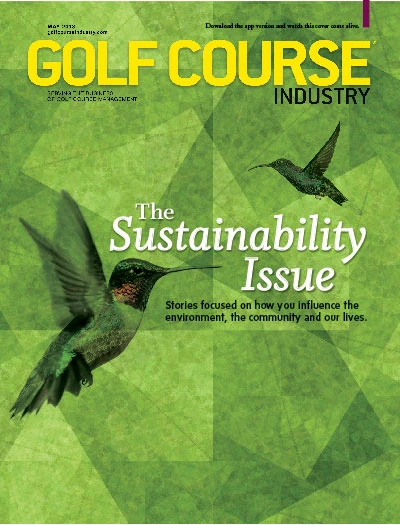 WCI Communities and the Hyatt Resorts, developers of Raptor Bay Golf Course in Bonita Springs, Fla., worked hand-in-hand with environmental groups and agencies to create sustainable natural areas for flora and fauna to share the land with golfers.
WCI Communities and the Hyatt Resorts, developers of Raptor Bay Golf Course in Bonita Springs, Fla., worked hand-in-hand with environmental groups and agencies to create sustainable natural areas for flora and fauna to share the land with golfers.
Raptor Bay GC stands as a shining example of such a partnership. The course, the first resort golf course in the world to receive the designation as a Certified Audubon International Gold Signature Sanctuary, has created a natural environment that thrives unabated despite the construction of a championship golf course. Great care was taken to preserve the habitat of the property’s flora and fauna through such measures as an innovative water management plan, the building of bridges from hole to hole that were elevated on pilings at a control elevation over normal rainy season high water marks, and environmentally sensitive best practice turf management, such as the use of slow release fertilizers, no application of solid fertilizers within 25 feet of any water control feature, use of native grasses and aquatic plants to screen storm water control features, and the adoption of an integrated pest management program.
More than 150 acres of land is preserved within the boundaries of Raptor Bay Golf Club. The skies are alive with life, as a series of nest cylinders and purple martin houses were established on the property, while other nest cylinders attract a wide variety of other birds to the site. An indication of the success of the club’s ongoing efforts at wildlife preservation, protection and promotion is the fact that after the nesting work was done, 22 species of birds that were not present in a December, 2001 study were on the property a year later.
One unique wildlife conservation feature at Raptor Bay is the presence of an active eagle’s nest. The club enforces a protection plan that defines primary and secondary protection zones based on radial distance from the nest site. Outreach efforts to the surrounding community include the establishment of a mile-long walking trail through a portion of the property, replete with signage and verbiage that points out features of interest.
The club has also partnered with the Conservancy of Southwest Florida in assessing aquatic fauna community composition along the water features of the golf course, with funding for the study provided to the Conservancy via a matching grant from the National Fish and Wildlife Foundation’s Wildlife Links Program. The purpose of the study is to investigate the community characteristics of water dependent animals, such as aquatic insects, fish and frogs in the ponds and wetlands of the golf course, with an eye on determining how differences in physical characteristics may or may not influence the habitat value of various ponds.
The public and hotel guests are thrilled by the efforts Raptor Bay has taken in regards to habitat preservation, says Superintendent Jason Brod.
“The natural layout and abundance of wildlife are two of the most surveyed answers we get from our resort guests,” Brod says. “Raptor Bay’s success can be contributed to the design and focus on sustainable resource management. If we were to build this course again we would not change a thing.”
Raptor Bay’s success, he says, has led to an increase in similar efforts at courses in the area.
“The fact that there are now many Certified Gold Signature golf courses in Southwest Florida is a testament to the benefits of this program.”
Speaking to water conservation, always a crucial issue for southeastern U.S. courses, Raptor Bay has a remarkably low total, only 60 acres of irrigated turfgrass, compared to a typical golf course that has over 100, Brod says. “This reduction in acreage has had a huge impact on the amount of water required to maintain the golf course,” he says.
.jpg)
John Torsiello is a freelance writer based in Torrington, Conn., and a frequent GCI contributor.

Explore the May 2013 Issue
Check out more from this issue and find your next story to read.
Latest from Golf Course Industry
- LOKSAND opens North American office
- Standard Golf announces new product lineup for 2025
- The Salt Pond taps Troon for management
- KemperSports selected to manage Swansea Country Club
- From the publisher’s pen: Grab that guide
- Introducing our April 2025 issue
- South Carolina leaders honor golf course superintendent
- One and only





